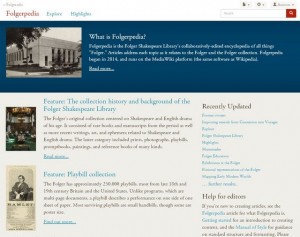Washington D C’s Folger Shakespeare Library has just announced an exciting new initiative. “Folgerpedia is the Folger Shakespeare Library’s collaboratively-edited encyclopedia of all things “Folger.” Articles address each topic as it relates to the Folger and the Folger collection. Folgerpedia began in 2014, and runs on the MediaWiki platform (the same software as Wikipedia).”
This blog post explains in more detail, and here are a couple of extracts from the post that explain a bit more about how you can join in:
Folgerpedia presents a source for information generated by you: readers, researchers, scholars, and Folger friends who wish to share your knowledge, your research process and its results, data you have generated using our collections, and more. We encourage you to share information on your favorite topics and to collaborate with others who share your interests while also learning from users who generate content on Folgerpedia….
Along with providing strong scholarly content, Folgerpedia acts as a repository for the Folger’s past performances and special events, exhibitions, seminars, colloquia and conferences. We have archived past programs from Folger Theatre, Folger Consort, O B Hardison Poetry Series, Folger Institute, and much more in Folgerpedia.
 The articles on these topics in Folgerpedia grant access to information that has long needed a useful home. Now, researchers of all types—from casual visitors, undergraduates, Institute attendees, docents, staff members, and advanced scholars—can approach and work with the Folger in an entirely new way.
The articles on these topics in Folgerpedia grant access to information that has long needed a useful home. Now, researchers of all types—from casual visitors, undergraduates, Institute attendees, docents, staff members, and advanced scholars—can approach and work with the Folger in an entirely new way.
It’s a great idea: organising and describing the varied materials within a collection is difficult enough: organising information relating to items within the collection is another challenge. Catalogues aren’t the place to put information about how different items link to each other, or where a particularly elusive bit of information was found. At the Folger, expert staff have created masses of material to build exhibitions, write lectures, deliver education programs or answer enquiries. Nobody should ever have to do all that work again. My own blog has been a place for me to put some of the knowledge I’ve gleaned over the years, and to find and pull together linked information on particular subjects using the internet. But blogs are organised in a linear way, and linking by subject is clumsy: an encyclopaedia format like Wikipedia where articles can change over time is much better. And allowing readers to contribute significant information themselves means that it can grow quickly. For anyone who’s done any work on Wikipedia (and I’ve done a little), the editing process will be similar but Folgerpedia contributors will have to be approved before they get going.
And having worked in another major Shakespeare collection, I know that there is a lot of crossover between collections. I’m aware, for instance, that the Folger has much material from the nineteenth-century antiquarian Halliwell-Phillipps including a set of research notebooks on the plays related to those kept in Stratford and a set of detailed sketches made to show the restoration work on the Birthplace, that it has American impresario Augustin Daly’s set of volumes relating to his Shakespeare productions, while he presented a similar set to the theatre in Stratford, and that the Folger has recently acquired the Gordon Goode photographic archive relating to RSC productions in the 1960s.
Researchers at the Folger have often done research at other major Shakespeare collections: the British Library, Shakespeare Centre Library and Archive, Birmingham Shakespeare Library, Shakespeare Institute Library, V&A Library, Dulwich College Library and many others. There’s tremendous potential to bring knowledge of the collections together. But even if all you want to do is look, do follow the links above to find the resources that are already available.


